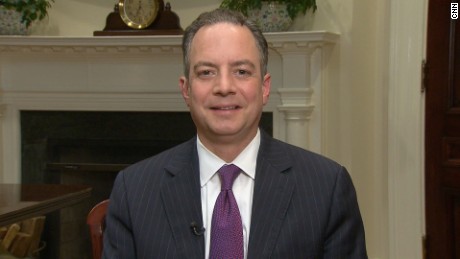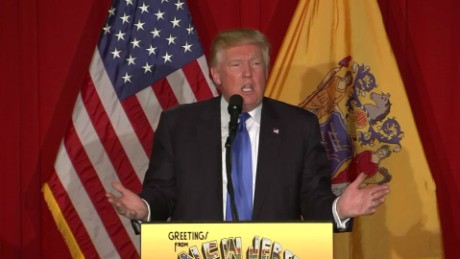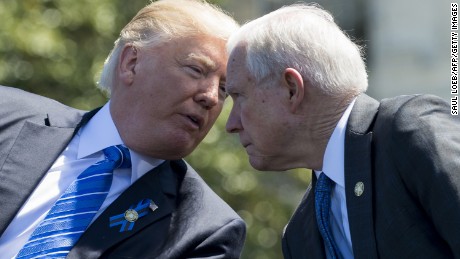Donald Trump is loyal -- until he's not
(CNN)From
long before he took office, President Donald Trump has touted loyalty
-- his to others, and others' to himself -- as a prize virtue.
It's at least half true.
Trump reiterated his philosophy on the matter a few years ago: "I'm loyal to people who've done good work for me."
"Good work" is, of course, a
subjective means of measuring one's service to Trump. But it's a
telling line mostly because of the subtext, which suggests Trump is
indeed willing to repay subordinates who advance his interests with
loyalty -- but only up to a point. When the "good work" ends or hits a
snag, as we've seen over the past seven months and during the campaign
before that, Trump's backing tends to do the same.
On this question, the story of Trump and his infamous McCarthyite mentor Roy Cohn is one case to consider. Here a few more timely snubs.
Mitch McConnell, interrupted?
The
President's recent treatment of Senate Majority Leader Mitch McConnell,
who narrowly failed to deliver the needed GOP votes to repeal
Obamacare, is the most immediate illustration of Trump's fickle fealty.
In
fairness, McConnell helped load himself into the barrel when he
criticized Trump, albeit mildly, during a Monday speech to a Rotary Club
in Kentucky.
"Our new President,
of course, has not been in this line of work before," McConnell said. As
it applies to the legislative process, he added: "I think (Trump) had
excessive expectations about how quickly things happen in the democratic
process."
The nuance there, that
cautious caveat, did not land well with the White House. Trump has now
spent the better part of the week assailing the top Senate Republican on
Twitter and in remarks to reporters during what's been a news-making
vacation at his golf club in Bedminster, New Jersey.
On
Thursday, he pointedly refused to back McConnell, suggesting what
remains of his faith in the majority leader will turn on future
performance.
"I'll tell you what,
if he doesn't get repeal and replace done, and if he doesn't get taxes
done, meaning cuts and reform, and if he doesn't get a very easy one to
get done, infrastructure, he doesn't get them done, then you can ask me"
again if McConnell should give up his post, Trump said.
GOP
senators have rallied around their colleague from Kentucky, mostly
expressing their support, appropriately enough, on Twitter. Absent from
those messages, so far, is the lengths to which McConnell went in
support of Trump during the 2016 general election. Most notably, according to The Washington Post,
McConnell balked at going public with a bipartisan statement when
presented by Obama administration officials with intelligence community
evidence of Russian meddling. He also threw his political body in front
of President Barack Obama's Supreme Court nominee for more than a year,
withstanding a fair amount of criticism, but keeping the seat warm for
his new President. Trump's appointment of Neil Gorsuch as a Supreme
Court Justice has been the legacy highlight of his tenure so far. On
those counts, McConnell did good work for Trump.
Reince Priebus, swatted away
Trump
and Priebus, then the Republican National Committee boss, had an
up-and-down relationship during the 2016 primaries. Despite leading in
the GOP polls for months before the first ballot was cast, the party
establishment (and many in the media) doubted Trump's viability, and
whether he could sustain his popularity, once the contests kicked off.
Priebus,
though, was clear on Trump's potential -- either to win or damage the
eventual nominee's chances in November by going a third party route.
There was drama over a loyalty pledge, which Trump signed, then waffled
on, but ultimately honored, if only because his frontrunner status
rarely wavered.
Whatever his
misgivings, Priebus never intervened and eventually (technically) joined
Trump's inner circle. His bald-faced backing cleared the way for other
Republicans climb aboard.
Now,
though, he is gone. Ousted in July after the Obamcare repeal effort
failed, his inglorious run as White House chief of staff, fly-swatting and all, was the shortest -- ever.
Chris Christie, sidelined
New
Jersey Gov. Chris Christie wasn't always quite so unpopular in his home
state. His decline began well before he left the Republican
presidential primary last year, but it's hard to imagine his decision to
immediately throw his allegiance to Trump did much to reverse the
slide.
Christie backed Trump before
it was perceived as a political imperative. His precise motives in
endorsing Trump are still not entirely clear. The theories range from
vengeance against other more mainstream candidates like Florida Sen.
Marco Rubio to strategic angling for future employment, or some
combination of those and more.
In any event, Christie's loyalty was rewarded first with mocking. Trump made a joke of the governor's weight during a rally in New Jersey
last May, then after winning the election, quickly sidelined Christie
from the transition team. Why? The reasoning was never made entirely
clear, but there are theories,
some of which are centered on the fact that Christie at one point put
Trump's son-in-law's father behind bars. Christie now remains in New
Jersey, sometimes on its beaches, and without a White House job.
Jeff Sessions, what did you do?
The
attorney general, before he was attorney general, was a US senator from
Alabama. He was also the first active member of that august body to
endorse Trump during the GOP primary. When the "Access Hollywood" tape
threatened to upend Trump's campaign, and some Republicans began to make
for the exits, Sessions stood firm: "This thing is overblown," he told
Fox News. "Everybody knows that Trump likes women."
After
being elected, Trump nominated his most high-profile Washington
loyalist to run the Justice Department. And there he remains -- if only
just! Sessions' decision to recuse himself
from a role in any investigation into the Trump campaign rankled the
President. Big league. When the deputy attorney general named a special
counsel to lead the Russia probe, after Trump fired FBI director James
Comey, the situation really deteriorated.
As
with McConnell, Trump didn't hesitate to air his ire on social media
and in a memorably caustic interview with The New York Times.
"So
why aren't the Committees and investigators, and of course our
beleaguered A.G., looking into Crooked Hillarys crimes & Russia
relations?", Trump, in his role as pundit-in-chief, tweeted on the
morning of July 24.
Sessions has managed to hang
on mostly because he refused to resign and his old friends in the
Senate made it clear Trump would not be able to quickly install a
replacement if Sessions was fired.
Asked this week about their relationship, Trump offered a bright, shining endorsement.
"It is what it is," he said with a shrug. "It's fine."
For now.







No comments:
Post a Comment